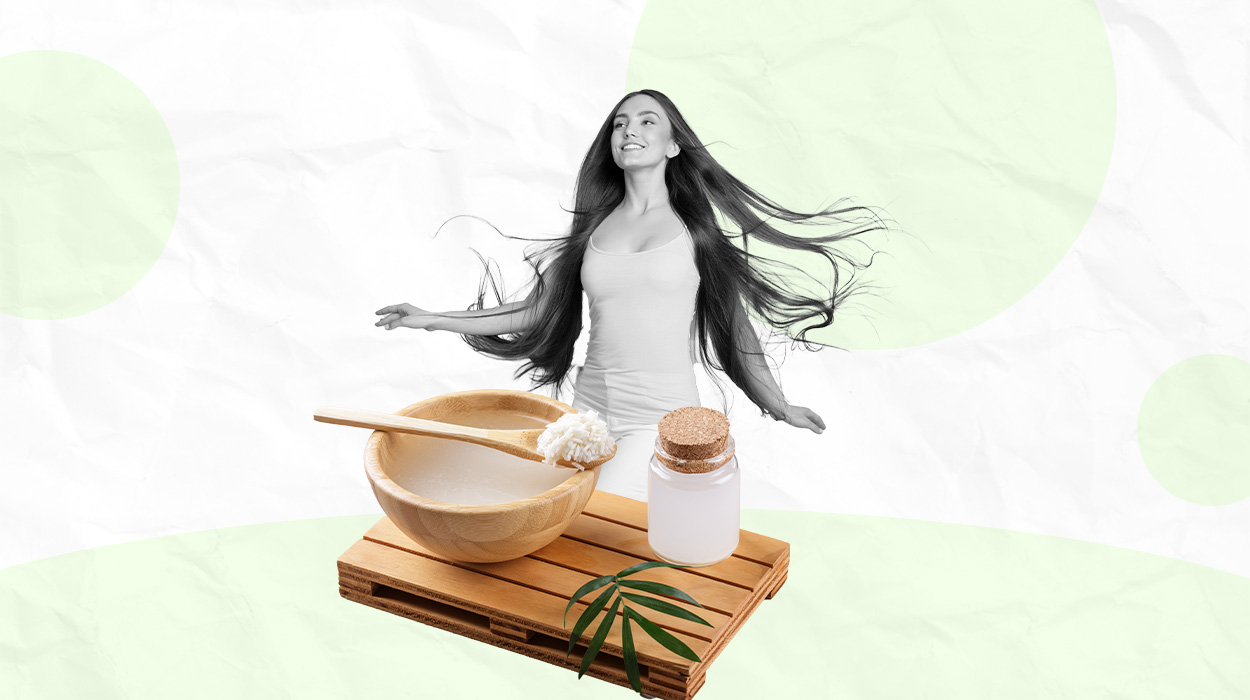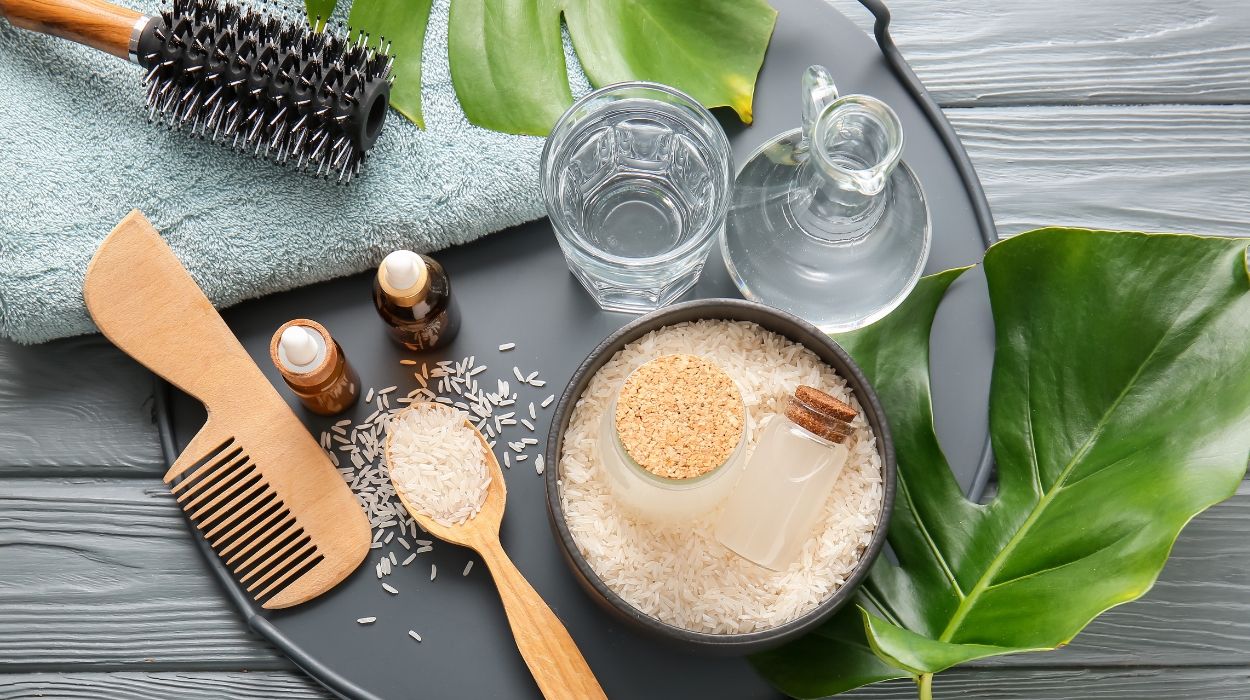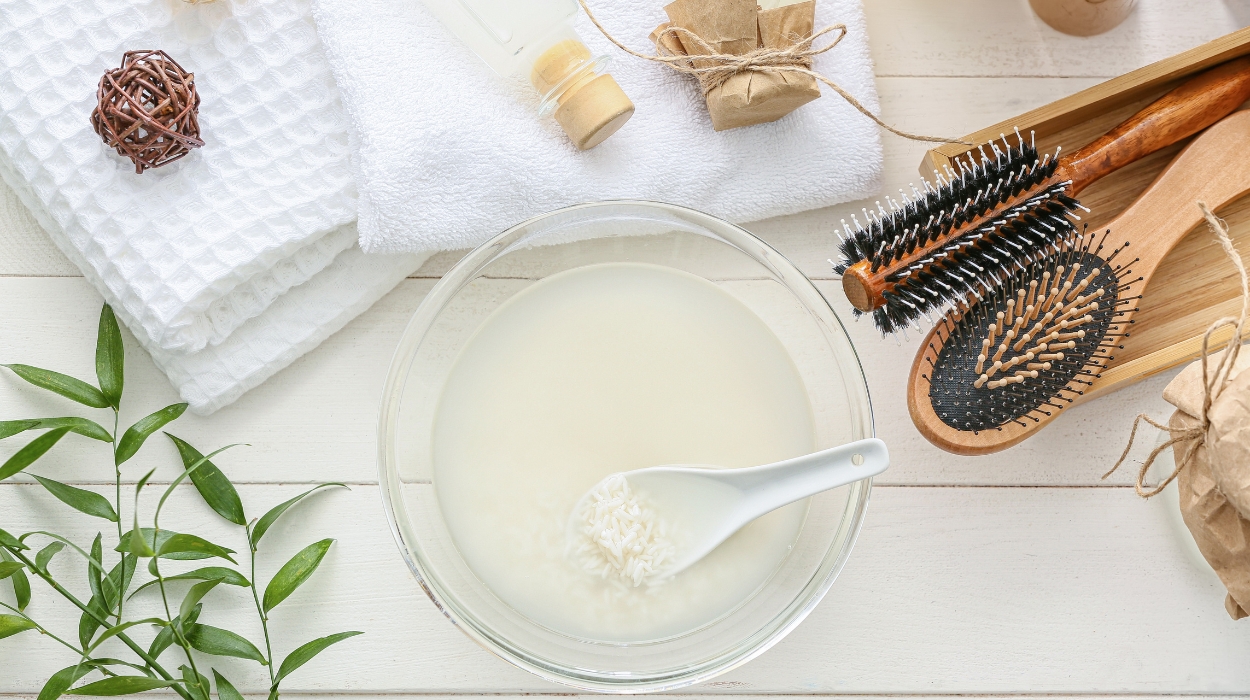 Expert's opinion
Expert's opinion
Expert's opinion
The article is a subjective view on this topic written by writers specializing in medical writing.
It may reflect on a personal journey surrounding struggles with an illness or medical condition, involve product comparisons, diet considerations, or other health-related opinions.
Although the view is entirely that of the writer, it is based on academic experiences and scientific research they have conducted; it is fact-checked by a team of degreed medical experts, and validated by sources attached to the article.
The numbers in parenthesis (1,2,3) will take you to clickable links to related scientific papers.
Rice Water For Hair 2024: Benefits & Ways To Use It For Hair Growth

Rice water has been used for centuries in many parts of the world as a natural remedy for hair and skin. It’s the starchy liquid left over from soaking or boiling rice, and it is rich in nutrients and antioxidants that are thought to nourish and strengthen hair.
It has recently regained popularity as a restorative do-it-yourself hair treatment, but does it work?
In this article, we’ll discuss rice water’s potential benefits, where to buy rice water for hair, and how to use it to help grow strong, healthy hair.
Rice Water Benefits For Hair
- Make Hair Stronger
- Smooth Hair
- Nourish Your Scalp
- Support Hair Growth
Rice Water For Hair Benefits
What is rice water for hair good for? It may help:
Makes Hair Stronger
Rice contains several amino acids required to build keratin — the tough protein that forms each hair strand. Rice water hair treatment delivers these amino acids to the hair root, strengthening it and promoting overall hair health and elasticity.
Additionally, rice water is rich in magnesium, an essential nutrient for building[1] proteins like keratin. A 2017[2] study showed topical magnesium treatments could boost magnesium levels in hair.
Smooths Hair
Frizzy, dull hair, and split ends are due to hair shaft and scalp damage.
Rice contains many antioxidants,[3] like vitamin E and zinc,[4] which may protect your scalp and tresses from damage caused by environmental factors like ultraviolet rays.
The result is smooth, silky, and shiny hair.
Nourish Your Scalp
Healthy hair begins with a nourished and healthy scalp.
By delivering B vitamins[5] to your scalp, rice water may help promote skin cell turnover and regeneration.
Furthermore, fermented rice water may help treat a specific type of fungal dandruff.
Promotes Hair Growth

By strengthening hair strands and nourishing the scalp, all of the nutrients found in rice water set the stage for healthy hair growth.
Beyond this, inositol — a starch found in rice — supposedly blocks androgen hormone actions leading to male and female pattern hair loss. However, there is little evidence supporting this claim.
Still, a 2017[6] study showed improved hair follicle activity and hair growth in patients treated with rice bran extract.
Bottom line — while it can provide nutrients to support hair health, don’t count on rice water for extreme hair growth. More research is needed to understand any direct effects of using rice water for hair loss or to aid hair growth.
Does Rice Water For Hair Work?
There is limited scientific evidence that rice water directly impacts hair growth. However, using rice water to grow healthy hair is a practice that has stood the test of time. Its long-standing anecdotal hair benefits suggest it’s worth seeing if it works for your hair needs.
Historians traced rice water’s beauty benefits as far back as the Heian[7] period in Japan — over 1,000 years ago. During this time, it was common for women to grow floor-length hair, which they kept healthy by bathing with rice water.
This regimen has carried through to modern-day China, where women in the Huangluo Village are renowned for having hair that averages six feet long and does not start to turn gray until they reach old age. They claim bathing with rice water contributes to their hair length and color retention.
Recently, rice water hair treatments have become a viral trend on social media. Rice water advocates claim it excels at restoring shine and strength to dried-out tresses.
So, what is it about rice water that has kept people using it for centuries to improve the health of their hair? Experts credit its allure to its ease of use and unique nutrient composition.
Nutritional Benefits Of Rice Water

Rice[8] contains many nutrients linked to hair health, including:
- Amino Acids.
- Antioxidants.
- B vitamins.
- Magnesium.
- Zinc.
- Vitamin E.
Through soaking or boiling, many of these nutrients are believed to transfer from rice into the rice water.
Inositol, a component of the starch in rice water, is also purported to play a role in preventing hair loss by blocking the production of the androgen hormone DHT. This hormone is pegged as a major contributor to premature hair loss. However, there is limited evidence demonstrating this benefit.
Ultimately, rice water has many promising anecdotal benefits, but nothing has been scientifically proven. Still, it’s an affordable and easy-to-use hair remedy that’s worth a try for anyone looking for natural options to improve the health of their hair.
How To Make Rice Water For Hair?
With its recent popularity, many rice water hair products have made their way to store shelves. However, making homemade rice water treatment for hair with basic ingredients from your pantry is simple.
There are three main methods for making DIY rice water — soaking, boiling, or fermenting rice. Soaking or boiling rice will be the fastest, but fermenting may provide a more potent hair elixir of vitamins, nutrients, and minerals.
Listed below are step-by-step directions for each rice water for hair recipe. Whichever method you choose, you’ll need to start with the following supplies.
- ½ cup of white or brown uncooked rice, thoroughly rinsed.
- Strainer.
- Large pot.
- Large bowl.
- Funnel.
- Spray bottle.
Directions For Soaking Rice
- Add rinsed rice to a large pot.
- Cover with two to three cups of water.
- Let sit for 30 minutes to one hour.
- Strain water into a separate clean bowl.
- Funnel rice water into a spray bottle and use it immediately or store it in the refrigerator for up to a week.
Directions For Boiling Rice
- Boil two cups of water in a large pot.
- Add well-rinsed rice to the boiling water and continue cooking rice for about 15 minutes or until the water is cloudy.
- Remove the pot from the heat and let the water cool to room temperature.
- Strain rice water into a clean bowl and place in the refrigerator to completely cool.
- Funnel the cooled rice water into a spray bottle. Keep in the refrigerator until you’re ready to use.
Directions For Fermenting Rice
- Add thoroughly rinsed rice to a large pot.
- Pour one to two cups of distilled water into the pot with the rice.
- Cover tightly and let the rice sit in the water for one to two days.
- Strain the rice into a clean bowl and funnel it into a spray bottle.
- Keep the spray bottle of fermented rice water in the refrigerator until you are ready to use.
How To Use Rice Water For Hair Growth?
Once you have made rice water or fermented rice water, there are several ways to apply it to your hair that will work for all hair types. To prevent dryness caused by the proteins in rice water, limit your use of these treatments to one to two times per week.
- Use as a post-shampoo rice water rinse: After shampooing your hair, pour uncooked rice rinse water over it and massage it into your scalp. Leave it on for 10 to 15 minutes before rinsing your hair thoroughly with cool water.
- Make a protein-rich hair mask. Mix rice water with a few drops of your favorite essential oil, such as lavender or chamomile, and avoid citrus-based oils. Massage this mixture into your hair, focusing on the ends. Leave it on for 30 minutes before rinsing completely with cool water. Pregnant women and those with an endocrine disorder should talk to a physician before incorporating essential oils into a skincare regimen.
- Use as a styling spray: Spray rice water onto your hair before styling. Doing this can help nourish and protect hair from heat damage.
Precautions And Side Effects Of Rice Water On Hair
While it’s full of nutrients that can improve the health of your hair and scalp, there are a few things to remember when using rice water for natural hair growth.
- Make sure you use plain rice, not instant rice or any other rice with added ingredients. Instant rice doesn’t have the same nutrient profile, and any additives may cause scalp irritation.
- Wash hair thoroughly after applying a rice water hair treatment. Doing this will help you avoid build-up that can cause flat and dull locks.
- Be aware that overuse of a rice water rinse or other treatment can lead to protein overload, causing brittle and dry hair. Stick to using a rice water hair treatment once or twice weekly.
- Avoid using rice water or any products that contain rice water if you have any allergies to rice.
Conclusion
While little scientific evidence exists to support rice water’s hair benefits, it has a long history of helping people grow healthy, beautiful hair. It is rich in vitamins, minerals, antioxidants, and amino acids, which help strengthen strands and promote hair growth for all hair types.
Due to a surge of interest in this therapeutic hair treatment, many rice water hair rinse products are now available in stores. However, it’s easy to make your own rice water at home.
A natural and affordable option, rice water is worth trying to see what it can do for your hair. Remember, it’s not a miracle solution for healthier hair and should be used in moderation and in combination with a holistic hair care routine.
+ 8 sources
Health Canal avoids using tertiary references. We have strict sourcing guidelines and rely on peer-reviewed studies, academic researches from medical associations and institutions. To ensure the accuracy of articles in Health Canal, you can read more about the editorial process here
- WB, V. (2023). The role of magnesium in nucleic-acid and protein metabolism. Magnesium, [online] 7(5-6). Available at: https://pubmed.ncbi.nlm.nih.gov/2472534/#:~:text=Magnesium%20is%20an%20essential%20cofactor,RNA%20and%20translation%20into%20protein.
- Uwe Gröber, Werner, T., Jürgen Vormann and Klaus Kisters (2017). Myth or Reality—Transdermal Magnesium? Nutrients, [online] 9(8), pp.813–813. doi:https://doi.org/10.3390/nu9080813.
- Chaudhari, P.R., Nishesh Tamrakar, Singh, L., Tandon, A. and Sharma, D. (2018). Rice nutritional and medicinal properties: A review article. [online] Journal of Pharmacognosy and Phytochemistry. Available at: https://www.semanticscholar.org/paper/Rice-nutritional-and-medicinal-properties%3A-A-review-Chaudhari-Tamrakar/0192d3113cdcbf5fdc6972f7aa23a0ba9ff5b95f.
- Trüeb, R.M., Henry, J.P., Davis, M.G. and Schwartz, J.R. (2018). Scalp condition impacts hair growth and retention via oxidative stress. International Journal of Trichology, [online] 10(6), pp.262–262. doi:https://doi.org/10.4103/ijt.ijt_57_18.
- Julian‐Dario Rembe, Fromm‐Dornieden, C. and Ewa Klara Stuermer (2018). Effects of Vitamin B Complex and Vitamin C on Human Skin Cells: Is the Perceived Effect Measurable? Advances in Skin & Wound Care, [online] 31(5), pp.225–233. doi:https://doi.org/10.1097/01.asw.0000531351.85866.d9.
- Kim, Y., Kwon, S.-J., Jang, H.-J. and Seo, Y.-K. (2017). Rice bran mineral extract increases the expression of anagen-related molecules in human dermal papilla through wnt/catenin pathway. Food & Nutrition Research, [online] 61(1), pp.1412792–1412792. doi:https://doi.org/10.1080/16546628.2017.1412792.
- Prachi Barsagade, Patil, P. and Umekar, M.J. (2021). A FORMULATION OF FACE PACK AND HAIR PRODUCTS OF RICE WATER FOR THE USE OF SKIN AND HAIR PROBLEM. [online] ResearchGate. Available at: https://www.researchgate.net/publication/352561846_A_FORMULATION_OF_FACE_PACK_AND_HAIR_PRODUCTS_OF_RICE_WATER_FOR_THE_USE_OF_SKIN_AND_HAIR_PROBLEM.
- Usda.gov. (2024). FoodData Central. [online] Available at: https://fdc.nal.usda.gov/fdc-app.html#/food-details/168876/nutrients.



